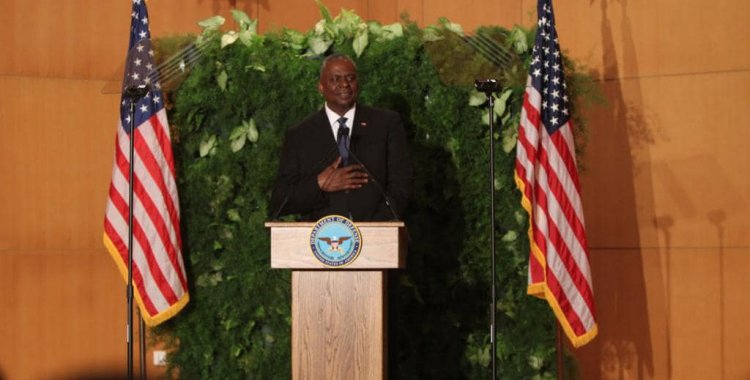Lloyd Austin spoke this Wednesday at the Historical Archive of Luanda to an audience that included ministers, representatives of the diplomatic corps and other individuals, at the end of his first trip to Africa and after visiting Djibouti and Kenya.
During his visit to Angola, the first by a US Secretary of Defense, he highlighted that the country has become "a highly esteemed partner" for the US and a "rising leader in the region and beyond".
"Therefore, we are deepening our cooperation with the Government in military modernization, training, maritime security and medical readiness", he stressed, expressing commitment to working together in areas such as peacekeeping, climate change, intelligence services and space cooperation.
For Lloyd Austin, the "thread" that runs through these areas is the "common interest in a secure, resilient and open Africa", ensuring that the United States does not take these partnerships for granted.
"The people of Africa deserve to chart their own sovereign paths. And we are not asking African countries to choose any side other than theirs", stressed the Defense official.
"Africa deserves better than outsiders trying to take control of this continent. And Africa deserves better than autocrats selling cheap weapons, pushing mercenary forces like the Wagner Group, or depriving starving people around the world of grain", he added.
Lloyd Austin also pointed out that African countries need responsive, transparent and civilian-led institutions that respect human rights and defend the rule of law.
"Africa needs civil leaders who remain faithful to their citizens, listening to their voices", stressed the senior North American official.
Therefore, he continued, the United States is committed to supporting policies that "promote peace, security and democratic governance" at a time of "profound challenge" for democracy in Africa.
"Across the continent, we have seen autocrats compromising free and fair elections and preventing peaceful transitions of power," he said, noting that, "when generals override the will of the people and place their own ambitions above the rule of law, security suffers and democracy dies."
Lloyd Austin stressed that Africa needs armed forces that serve its citizens, not the other way around, and that the US will continue to invest in professional, civilian-led armed forces.
"We will work together to deepen standards against the overthrow of democratic governments", he stressed.
Lloyd Austin highlighted the importance of Africa for the United States, showing optimism about the future of the continent.
He focused on Defense, highlighting that North American military forces interact with their African partners, "in order to make the continent and the world safer, free and fair", and want to deepen defense relations "based on equality and mutual respect".
"We are joining new partners and building new coalitions to oppose aggression and defend sovereignty," he declared, assuring that the US wants to empower its partners to find local solutions to the dangers they face.
These threats include violent extremism, piracy, cyber vulnerabilities and climate catastrophes, "made worse by tenuous governance, predatory institutions or persistent poverty", he noted.
Among the partnerships, he highlighted cooperation in maritime security and the role of Africom (United States Africa Command) in combating extremist organizations, such as Al-Shabaab or the Islamic State (ISIS).
"We are deepening our counter-terrorism cooperation with Kenya, Morocco, Tunisia, Djibouti and many other countries," said Lloyd Austin, adding that the United States is also committed to preventing conflicts.
"One of our main partners in this field is Mozambique, whose president I received at the Pentagon last week", he stated, addressing the Maputo Peace Accords, which sought to put an end to an outbreak of extremist violence that had lasted for years, "a work that is far from finished."
"But it is an inspiring example of how a country can move from a fragile ceasefire to lasting stability," he reinforced.
Cooperation also extends to cybersecurity "to help African countries combat the digital evil of external disinformation", space exploration, health and climate change, he added.
Lloyd Austin also highlighted the evils of slavery, the first connection between the United States and Angola.
"The horrors of slavery will always be part of the common history of our two countries. And we must never forget them", he observed, noting that the ocean that once transported desperate and enslaved people from Angola to America is now "a basin of peaceful cooperation".
The North American official also spoke of "America's imperfections", using his own example, as a "son of America's segregated south" who became the first black US Secretary of Defense, concluding that "nations must march towards to increasing freedom.”
"Let's work together on the great security challenges of our times," he appealed.







